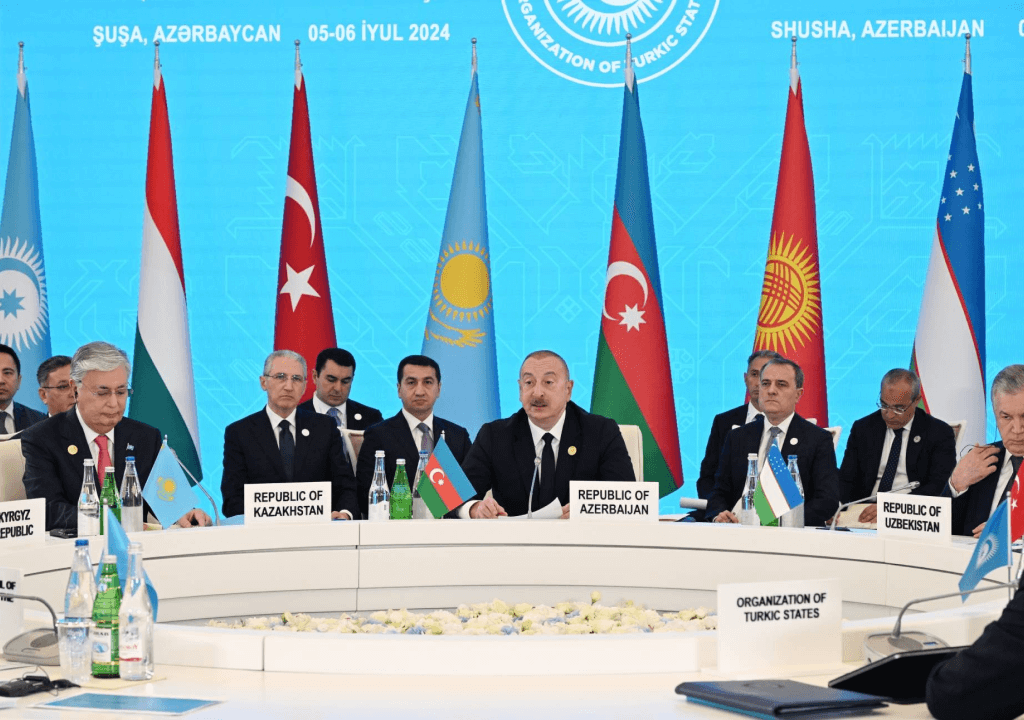Turkic and Turkey might sound confusing, like Turkey the bird and Turkey the country, but there’s a distinction. Turkey is a Turkic state, but not all Turkic states are Turkey. Let’s not drag this into more confusion: Turkic states are a group that includes Turkey. They share a common ethnic background, similar language, cuisine, and almost identical culture, extending from Kazakhstan to Turkey. This includes most Central Asian countries except Tajikistan, the Caucasian state Azerbaijan, and Turkey (Türkiye). Some even include Hungary due to historical and linguistic ties.
Currently, these countries are part of an evolving group that can influence Asian politics, global politics, and the global economy. They support and care for each other, with kebabs being a beloved symbol of their shared culture. Historically, the political evolution of this group was limited due to Russian influence. Now, they are free and more united.
The Organization of Turkic States (OTS) is the union of Turkic states that we are discussing. It includes Kazakhstan, Uzbekistan, Kyrgyzstan, Azerbaijan, and Turkey as full members, with Turkmenistan, Hungary, and Northern Cyprus as observers. The OTS was founded in 2009 to strengthen the bond between these countries. During the 8th summit in 2021, the organization was restructured to enhance cooperation, with refreshed objectives ranging from trade to extradition agreements. While many believe the OTS’ main aim is cooperation and growth, others think the organization’s main objective is the cultural revival of Muslim Turkic culture and protection from external influences, such as Russia’s historical cultural integration with Central Asian countries. As OTS eagerly pursues expanded trade relations with the West, the leaders of Turkic states in Eurasia are cautious about importing Western values.
The latest summit of the OTS was held in Azerbaijan, showcasing the dichotomy of interests among the Turkic heads of state. Hosted by Azerbaijani President Ilham Aliyev in the Nagorno-Karabakh town of Shusha, a region recently recaptured from Armenia, Aliyev highlighted in his opening remarks his vision for the Organization of Turkic States (OTS) to become an influential global entity capable of protecting regional interests from outside influence. He emphasized that the OTS should become one of the prominent international forces, stressing the commitment of their peoples to traditional values and shared ethnic roots that closely bind their countries. According to him, the 21st century must be a century of progress for the Turkic world.
After praising traditional values and shared heritage, Aliyev stressed the significance of enhancing trade, declaring, “Expanding the East-West transport corridor is among our foremost priorities”. His sentiments were echoed by other participants, including Kazakhstan’s president, Kassym-Jomart Tokayev, who stressed the need to utilize the full potential of the Trans-Caspian international transport route. Hungarian Prime Minister Viktor Orban, who attended the Shusha summit, referred to the OTS as a “Very important organization for cooperation between the West and East”.
Aliyev urged his fellow heads of state to show greater commitment to the OTS through increased budget allocations, noting Azerbaijan’s recent $2 million contribution to enhance the OTS secretariat. They recognize the economic potential of the bloc, as member countries are rich in minerals and generate significant revenue from their resources. With Russia’s influence weakening, superpowers such as China, India, Korea, and the United States are keen to explore opportunities in the region. It is believed that uniting these countries will increase their scope and opportunities.
Political scientists believe that the OTS represents a solution for Turkic leaders to navigate their complex political relationships. Aliyev’s efforts to bolster the OTS come at a time when Baku’s relations with the West have deteriorated. Over the past year, Aliyev and other top Azerbaijani officials have openly expressed grievances against the U.S., France, and major European bodies. In his inaugural address in February, Aliyev signaled further divergence from the West, speaking enthusiastically about pan-Turkic cooperation. Although Aliyev appreciates ties with Russia, they maintain a certain distance. Azerbaijan frequently boasts of its friendship with Pakistan, considers Turkey a brother, and is open to cooperation with India and Iran for trade. While trade is welcome, maintaining Turkic identity is their top priority. This sentiment is shared by other Turkic states, which rely on trade with various superpowers but prioritize their cultural unity and Turkic identity.
It’s certain that the OTS has great potential. With its strategically important location, population, economy, minerals, and everything necessary to grow into a superpower, they can impact world dynamics akin to the impact of the EU on global dynamics. United, they will gain more bargaining power and can effectively utilize their resources, particularly minerals currently in high global demand. The geographical area, intersecting important trade routes across all directions, west to east and north to south, will promote their growth. So, if they remain united, as Aliyev said, it’s a century for the Turkic world.








